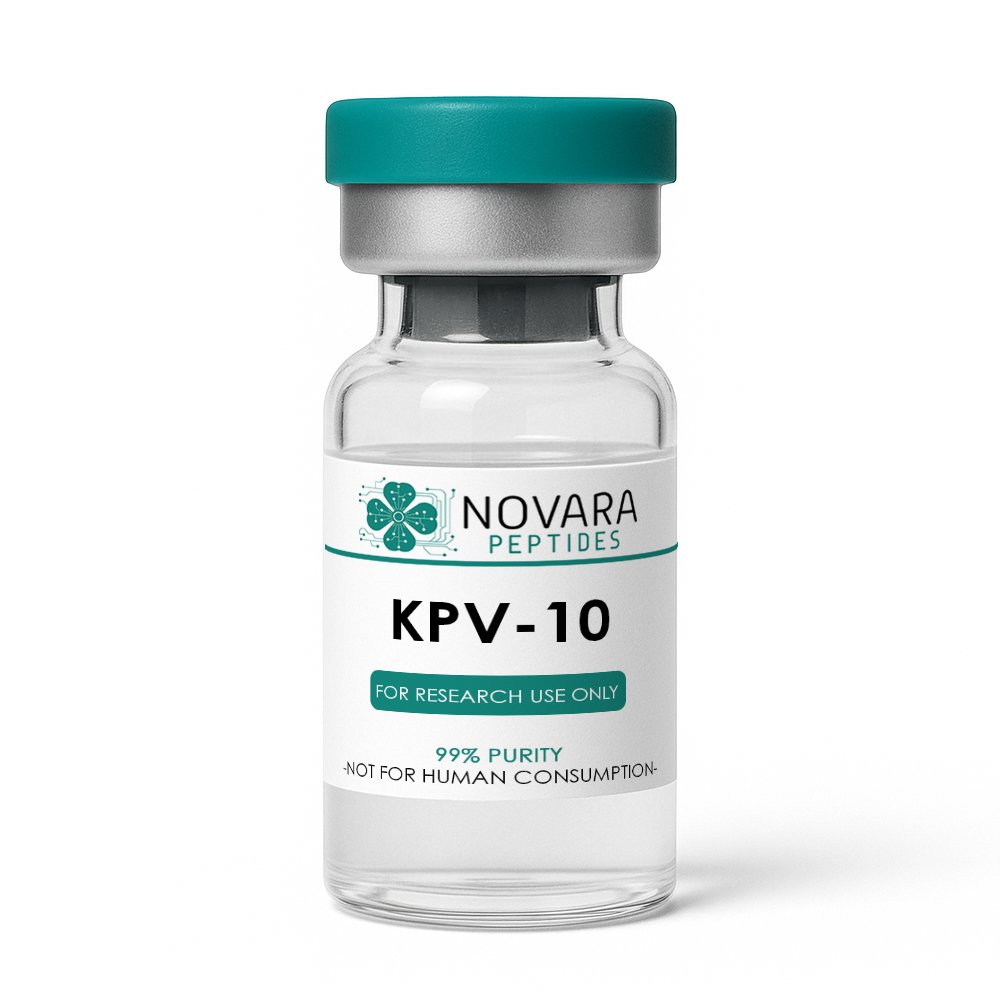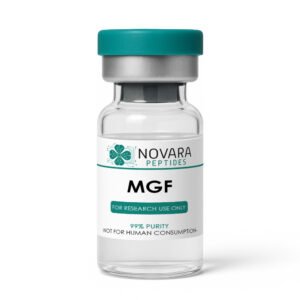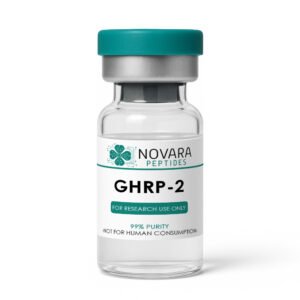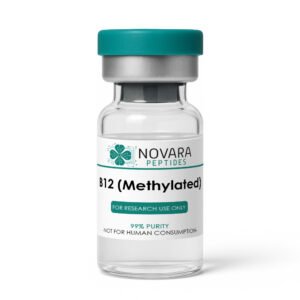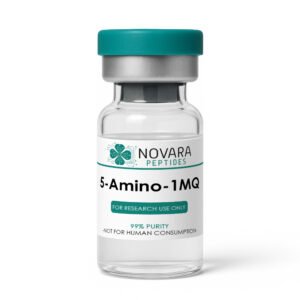KPV-10 – 10mg
All products are for laboratory research purposes only. Not for human consumption, medical, or veterinary use. ION Peptides does not condone or support the use of peptides outside of controlled scientific research. By purchasing, you acknowledge that you are a qualified researcher or institution. You must be 21 or older.




KPV-10 (Acetyl-Lys-Pro-Val)
Research-Grade Anti-Inflammatory Peptide
Tagline: Inflammation & Immune Modulation Research
Product Description
KPV-10 is a synthetic peptide derived from the C-terminal tripeptide sequence of alpha-melanocyte stimulating hormone (α-MSH) — Lys-Pro-Val — formulated in a 10 mg vial for research use. This peptide fragment is widely studied for its ability to reduce pro-inflammatory cytokine production and modulate immune system signaling.
Researchers use KPV-10 in studies focused on gut inflammation, skin barrier function, immune regulation, and chronic inflammatory conditions. It is especially relevant for models of colitis, dermatitis, and systemic inflammation.
For Laboratory and Scientific Research Use Only. Not for Human Consumption.
Why Researchers Choose KPV-10
Potent α-MSH Fragment: Retains anti-inflammatory activity without pigmentation effects.
Cytokine Modulation: Downregulates NF-κB and inflammatory mediators like TNF-α, IL-6, and IL-1β.
Supports Gut & Skin Research: Studied in intestinal barrier protection and wound-healing models.
Highly Stable: Resistant to rapid degradation in experimental settings.
Batch Verified: ≥98% purity confirmed by HPLC and mass spectrometry.
Important Note
For laboratory and scientific research only. Not for human consumption, veterinary use, or diagnostic purposes.
| Chemical Formula | C₁₆H₂₆N₄O₅ |
| Molecular Mass | 354.4 Da |
| CAS Number | 82752-99-6 |
| Form | Lyophilized peptide powder |
| Shelf Life | 24 months (lyophilized) |
| Intended Use | For preclinical and in vitro research only |
| Storage | -20 °C (dry powder), -80 °C (after reconstitution) |
Research Applications
Anti-Inflammatory Studies
KPV-10 has been shown to significantly reduce inflammatory cytokine production and NF-κB activation in preclinical models [1].
Gut Barrier & Colitis Models
Protects intestinal epithelial cells, reduces colitis severity, and improves gut permeability markers [2].
Dermatology & Wound Healing Research
Demonstrated to accelerate wound closure and reduce local inflammation in skin injury models [3].
Systemic Inflammation & Sepsis
Explored as a modulator of systemic cytokine storms and endotoxin-induced inflammation [4].
References
Getting SJ et al. (2006). Melanocortin Peptides and Their Anti-Inflammatory Effects. Pharmacol Ther.
https://www.cell.com/trends/pharmacological-sciences/abstract/S0165-6147%2802%2902103-XCatania A et al. (2010). α-MSH Peptide Fragments and Intestinal Inflammation. Ann NY Acad Sci.
https://www.sciencedirect.com/science/article/pii/S0196978196003452Lipton JM et al. (1999). Anti-Inflammatory and Wound-Healing Effects of KPV. Peptides.
https://jpet.aspetjournals.org/article/S0022-3565%2824%2930846-8/fulltextStar RA et al. (2012). Melanocortin Agonists in Sepsis and Systemic Inflammation. Mol Med.
https://onlinelibrary.wiley.com/doi/epdf/10.1100/tsw.2010.173
Mechanism of Action (How KPV-10 Works)
Melanocortin Receptor Activation: Binds to MC1R and MC3R, triggering anti-inflammatory signaling [Getting 2006].
NF-κB Inhibition: Suppresses NF-κB translocation, reducing pro-inflammatory gene transcription [Lipton 1999].
Cytokine Reduction: Decreases levels of TNF-α, IL-6, and IL-1β in inflammatory models [Catania 2010].
Barrier Protection: Enhances epithelial tight junction integrity and reduces mucosal permeability [Catania 2010].
No Pigmentation Effects: Unlike full-length α-MSH, KPV does not stimulate melanogenesis [Getting 2006].
References
Getting SJ et al. (2006). Melanocortin Peptides and Their Anti-Inflammatory Effects. Pharmacol Ther.
https://www.cell.com/trends/pharmacological-sciences/abstract/S0165-6147%2802%2902103-XCatania A et al. (2010). α-MSH Peptide Fragments and Intestinal Inflammation. Ann NY Acad Sci.
https://www.sciencedirect.com/science/article/pii/S0196978196003452Lipton JM et al. (1999). Anti-Inflammatory and Wound-Healing Effects of KPV. Peptides.
https://jpet.aspetjournals.org/article/S0022-3565%2824%2930846-8/fulltextStar RA et al. (2012). Melanocortin Agonists in Sepsis and Systemic Inflammation. Mol Med.
https://onlinelibrary.wiley.com/doi/epdf/10.1100/tsw.2010.173
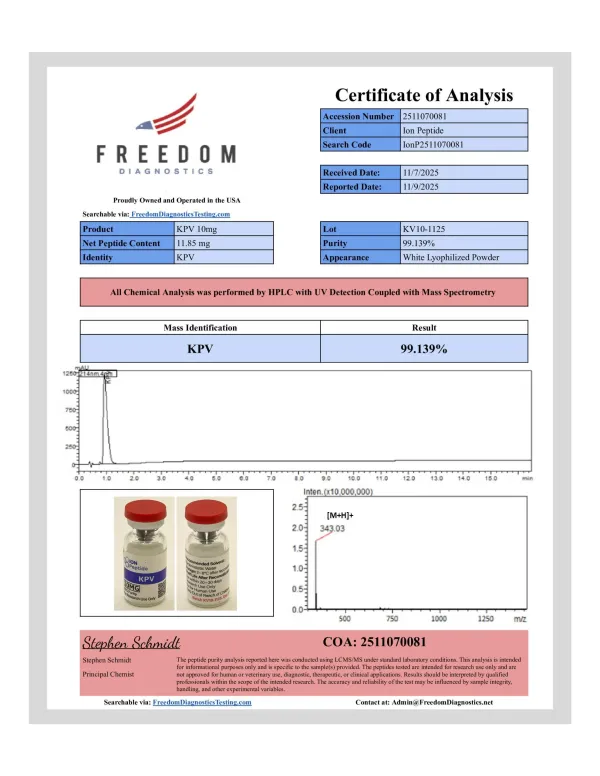
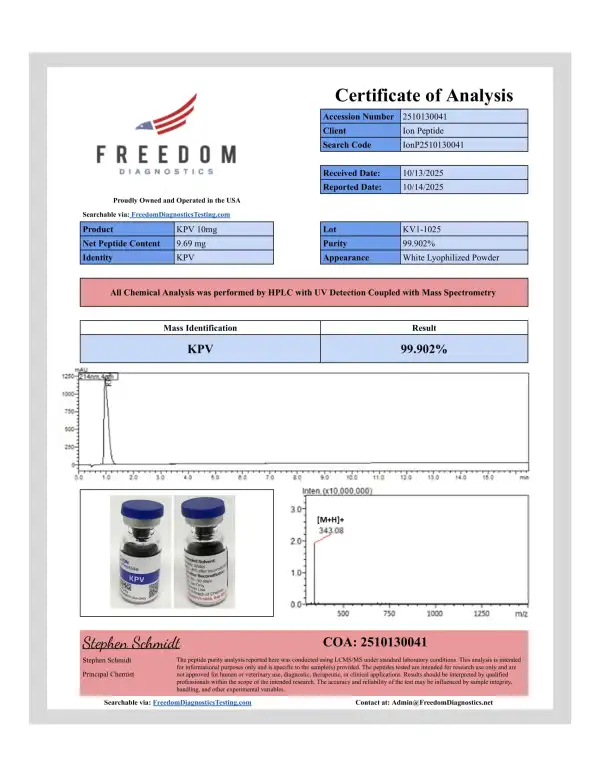
Related products
-
5-Amino-1MQ
$ 35.00 – $ 115.00Price range: $ 35.00 through $ 115.00 Select options This product has multiple variants. The options may be chosen on the product page

